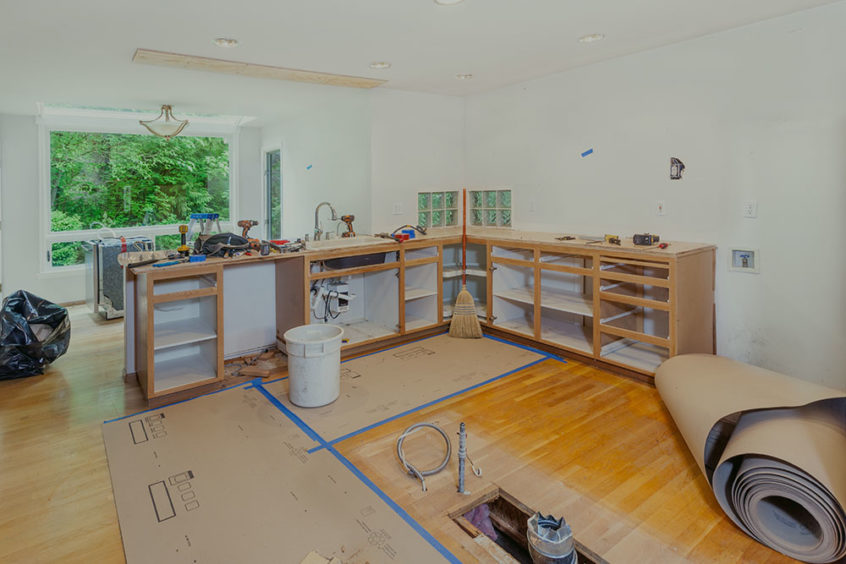A major home remodel can be a stressful and uncertain season in the life of a homeowner.
Between concerns about schedule shakeups, unforeseen expenses, and living with a construction site in your own house, a major home remodel can strike fear in the heart of a homeowner. One thinks of the Tom Hanks comedy “Money Pit,” where an unsuspecting couple ends up in deep debt and nearly loses their relationship trying to renovate a fixer-upper. “For sure, remodeling can be a stressful and uncertain season,” agrees Clay Lockley, president of Sage General Contracting. “But we think that working with a trustworthy, conscientious general contractor can put your mind at ease as you work toward the home of your dreams.”
1) Schedule Your Home Remodel Project
Careful planning can save you considerable stress once projects are underway. Timing is everything, so sit down with your calendar and figure out what time would best suit your household. Do you have kids in your home? If so, you might opt to begin construction in the fall when they are back in school. Do you plan to entertain at home during the holidays? You might want to avoid the busy end of the year between Thanksgiving and New Year’s. Be sure to consider family events and celebrations before you commit to your project.
2) Consider Your Daily Routine
Do you work from home? Do you work non-traditional hours? Do you have young children with nap schedules? A home remodel can be disruptive, with construction crews in the home weekdays from 8 to 5, so take that into consideration as you schedule your project.
3) Keep your children safe
It’s important to make sure that your children feel safe and comfortable with the various workers coming in your house and the work zones in place for the duration of your project. Therapist and mediation specialist Erin Johnston says that children should be introduced to everyone working on the project, and have a good sense of work area boundaries. “It’s a good idea to introduce the kids to workers who will be in the house on an ongoing basis, both for safety and comfort factors,” she says. “Kids should know the rules about who is allowed in the house, where they can go, and what they can do.”
4) Think About Pets
Plan to keep your canine and feline family members safe during a home remodel. If you have pets, you’ll need to restrict their access to the construction area, especially during work hours. With doors opening and closing, it’s easy for pets to escape, and tools in the house can be a hazard for curious pets. If it is difficult to keep work zones sealed off, or if your pets are easily frightened or upset by loud construction noises, consider finding a sitter or care-taking facility for them, at least during work hours. The best bet is to put pets in a crate, take them to a pet boarding facility, or have them cared for by a friend while work is being done in your home.
5) Protect Furniture and Clear a Path
Before we begin demolition work, our crew protects the home by sheeting off areas, and we do the best we can to minimize and contain dirt and dust during construction. Customers can also help by covering furniture with sheets, removing pictures from the walls, making a clear path to hallways that lead to bathrooms or basements, storing away personal items and decor, and clearing out cabinets.
6) Consider Your Neighbors
When dealing with neighbors, the National Association of Home Builders’ website suggests taking the following measures:
- “Let neighbors know well in advance about your home remodeling plans and keep them apprised of progress, detail by detail. Tell them when work will begin, the approximate completion date, what work will be done, and whether workers might have to come onto their property. If delays arise, promptly contact your neighbors to inform them of the revised schedule.”
- “Make sure noisy power tools are only used during standard business hours. Reasonable hours are 8 a.m. until 5 p.m.”
- “Inform your neighbors of any large trucks entering the neighborhood and ask subcontractors to park on one side of the street only.”
7) Communicate with Your General Contractor
Resolving your concerns and evaluating your options along the way are the best ways to reduce stress and frustration during the home remodel. Ask as many questions as necessary and clarify points of uncertainty immediately, even if the contractor appears dismissive of the questions. Issues that you notice but don’t address are likely to become negative focal points in living with the space, resulting in a feeling that things are not complete or done poorly.
8) Steer Away from Arguments
No one likes to admit it, but home improvements can become a source of friction for some households. Communicate with your partner or family members about your personal priorities, needs, and desires for use of space, reasons for design preference, and project timeline. Finding goals you agree on and keeping them in mind as you move forward will assist couples in keeping away from emotional arguments and indecision.
9) Plan Fun Getaways
There might be moments during the remodel when you miss your quiet, private surroundings and need some space. Budget time to step away from the mess, clear your mind, and refocus. Consider scheduling a family vacation during your remodel for a time out of the house. Take these opportunities to remember why you began this project and visualize your ultimate goal.
10) Expect Murphy’s Law
The general rule of kitchen remodeling is to expect Murphy’s Law to be in full effect. Everything that has a chance to go wrong can go wrong, even things outside of the kitchen. For example, take this remodeling horror story, shared by Gwenna Gundy with This Old House: When she was replacing the floor in her bathroom, she was surprised to discover more and more tile installed behind the appliances. But the real shock came when she lifted tile behind the tub and saw roof shingles. The entire wall and insulation behind the tub had rotted away. “One discovery after another, and we were eventually forced to gut the entire bathroom right down to the studs. Triple the cost later, we have a functional bathroom.” With so many potential surprises, it’s essential that you and your contractor are on the same team. Talk to your contractor to make sure that they have experience with the improvements you desire and the time to devote to your project, including any unforeseen obstacles. The lowest price may not be the best deal; trust and reliability come first.
We are available to discuss any questions you might have about your next home remodel or repair. Give Sage General Contractor a call at 972-420-6500 and let us provide a free, no-obligation inspection. Let’s talk!


